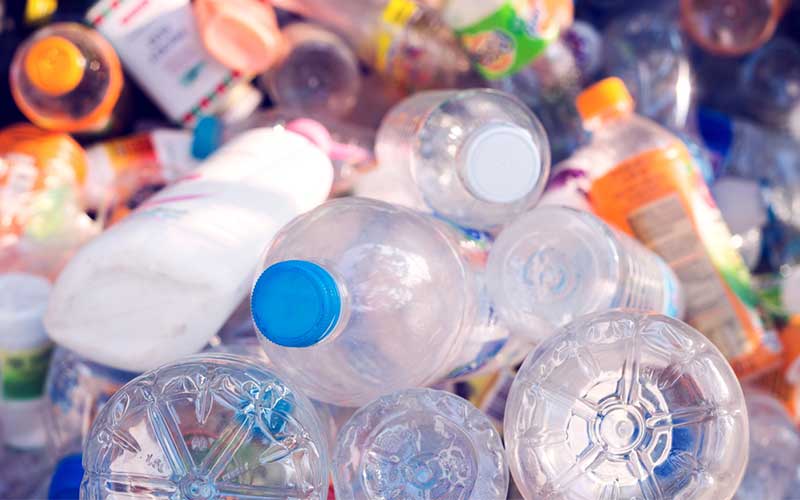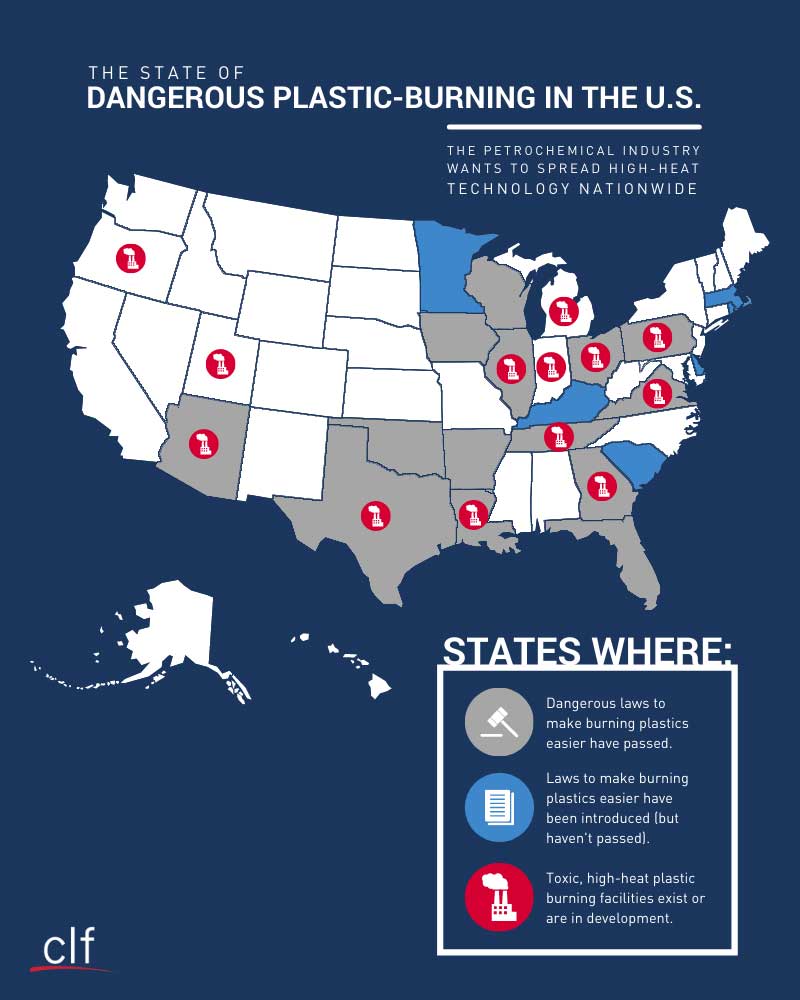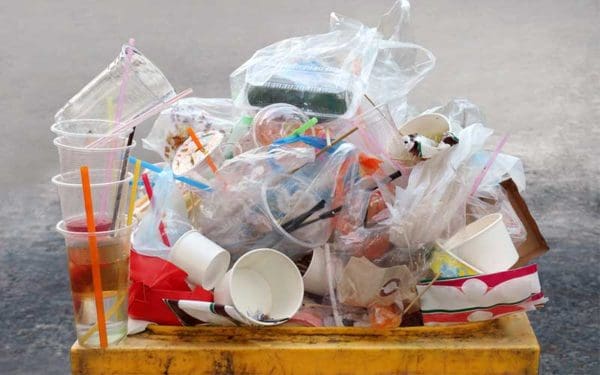
The plastics and petrochemical industries have now tried to pass pro-burning laws in at least 20 states across the country. Photo Credit: Teerasak Ladnongkhun via Shutterstock
It’s no secret that single-use plastics are sourced from dirty fossil fuels. As a result, plastics production, use, and disposal pose critical threats to our health, environment, and climate. But the powerful interests directly responsible for our plastics crisis – the petrochemical and plastics industries – claim they have a “solution.”
They want to make it easier to burn plastics with high-heat processes, like gasification and pyrolysis. Why? So that they can go on producing as much plastic as possible while pretending to be a part of the solution. But gasification and pyrolysis generate the same dangerous pollutants as “conventional” trash incineration. What’s more, most of these facilities turn plastic into dirty, climate-damaging fuels.
Despite the known hazards, industry groups are pushing states throughout the U.S. to pass laws that would make it easier to build gasification and pyrolysis facilities. In the states where these efforts succeed, high-heat waste burning facilities soon follow.
But CLF is pushing back against these false solutions by supporting New England states in their efforts to protect our communities and the environment. Right now, we’re working in Rhode Island to support legislation that would ban all new plastics-burning facilities, along with waste-burning facilities of any kind.
Industry Groups Want Weaker Laws that Allow for More Burning Across the Country
Industry groups claim that burning plastics with high-heat technology is safe and environmentally friendly – and that it generates renewable energy. But these claims are false. Nothing about burning plastic is clean or renewable.
What’s more, in the push to build high-heat facilities, groups like the American Chemistry Council are campaigning for laws that excuse them from regulations aimed at protecting public health and the environment. Typically, solid waste processing facilities must follow certain emissions and toxicity regulations. The American Chemistry Council and its allies instead, want high-heat facilities to be regulated as manufacturers, subjecting them to weaker rules and pollution controls.
Between 2017 and 2019, Florida, Wisconsin, Georgia, Iowa, Tennessee, Texas, Illinois, and Ohio all caved to the American Chemistry Council and other industry groups. Each passed laws making it easier for high-heat facilities to burn toxic plastics and other waste. Pennsylvania joined this list in 2020. And, so far in 2021, Virginia, Oklahoma, Arizona, Arkansas, and Louisiana have hopped on the burning bandwagon.
Legislatures in at least four other states, including Rhode Island, also considered pro-pyrolysis bills in 2021. And as recently as 2019, similar bills were introduced in both Massachusetts and Delaware.

The Industry’s Pro-Plastic Burning Playbook
The pattern here is clear: plastics and petrochemical industry groups push pro-burning laws on states under the guise of helping the environment. In reality, their sole objective is to increase corporate profits. Where they succeed, plastic-burning facilities are soon built, often in historically marginalized and disenfranchised areas – at the expense of the environment, climate, and public health.
Take Illinois. Immediately after passing its pro-burning law in 2019, the petrochemical industry got to work. Now, two plastics producers are building a facility in Channahon that will use pyrolysis to burn up to 100 tons of polystyrene per day. And BP – the fossil fuel giant responsible for dumping 4 million barrels of oil into the Gulf of Mexico in 2010, and which has spent huge sums of money fighting against climate action – is building a high-heat facility in Naperville.
Similarly, Georgia passed a pro-burning law in 2018. That same year, a fuel company built a facility in Atlanta that turns plastics into fuel. The plant sits near low-income communities and communities of color in an area of western Atlanta with significant environmental burdens and historic sources of pollution. What’s more, the facility ships many of its plastic-derived fuels and “chemical feedstocks” to a Shell chemical plant in Norco, Louisiana. That plant has a long history of environmental violations and significant health impacts on nearby communities of color.
Pushing Back on Pro-Burning Laws
The plastics and petrochemical industries have now tried to pass pro-burning laws in at least 20 states across the country. More often than not, they’ve succeeded. We cannot allow them to continue.
Right now, Rhode Island legislators are considering legislation that would ban all forms of high-heat waste processing including “conventional” incineration, gasification, pyrolysis, and so-called “advanced recycling.” Instead of opening its doors to burning toxic waste, Rhode Island has a chance to prevent the environmental damage, health risks, and injustices that come with high-heat waste technology.
Unsurprisingly, the plastics and petrochemical industries oppose Rhode Island’s attempt to protect its environment and communities. And, they’re continuing to push legislation that would make burning plastics easier. Even without the industry-sponsored law, Rhode Island is already facing a proposal to use pyrolysis to burn medical waste.
Burning plastics is not the answer, and it never will be. More than ever, we need laws in place that protect New England residents from the dangers of waste-burning technologies. Banning all new, toxic, high-heat waste burning facilities would be a great start.



